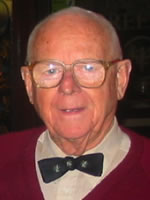Obituary - Dr James Francis Gwynne
Jim Gwynne was born in Sydney on 3 January 1925. When he was 18 months old the family moved to Auckland New Zealand when his father was appointed as the first radiologist to the Auckland Hospital Board.

Dr James Francis Gwynne
(1925-2010)
|
JF (Jim) Gwynne practiced as an Anatomical and Forensic pathologist for 40 years mainly in New Zealand where he worked in Auckland, Dunedin and Christchurch. In 1985 he moved to Brisbane where he worked at the John Tonge Forensic Institute from 1985 until 1993. He finally retired from teaching medical students in 1997 but retained his interest in and support of the UQ pathology museum until 2007. Jim was devoted to the public sector and was never attracted to private practice, which would have deprived him of his special enthusiasm for teaching and the study of disease by major surgical pathology and autopsy examinations.
Jim was educated at King's Primary School and Auckland Grammar, and graduated from the Otago Medical School in 1950. He was a mediocre medical student but won Blues in rugby and athletics. After two years as an intern in Dunedin Hospital Jim entered pathology as a registrar without commitment but he soon became a staunch advocate as he recognised its importance along with anatomy and physiology as the basis of sound medical practise. After four years in the Otago department of pathology he obtained an MD in pathology. In 1957 he became a Fellow of the Royal College of Pathologists of Australasia and in 1960 he was elected a founding Fellow of the Royal College of Pathologists (UK).
In 1956 he moved to Auckland being employed as pathologist in charge successively at National Women's, Middlemore and Green Lane Hospitals. He also took a special interest in neuropathology. In 1964 he returned to Dunedin and the Otago University as a Senior Lecturer and then Associate Professor until 1979 when he was appointed pathologist in charge at the Princess Margaret Hospital in Christchurch. He stayed there until he moved to Brisbane in 1985.
In 1970 Dr Gwynne was awarded the Wolfson Travelling Fellowship studying major side effects of therapeutic drugs in the United Kingdom and the United States of America. On return to New Zealand he undertook a national speaking tour where he reported his findings to clinical and pathology colleagues.
Dr Gwynne was the chairman of the New Zealand National Road Safety Research Council. He was also a member of the New Zealand working party to review relationships between the police and the forensic services. He was on the Otago University Medical Faculty Executive at the time of their centenary and he was a member of the executive of the New Zealand Society of Pathology, which preceded the establishment of the Royal College of Pathologists of Australasia.
In Brisbane Dr Gwynne performed forensic autopsies for the health department and was a part time teacher in the University of Queensland medical school in both pathology and anatomy, until his retirement in 1997.
Dr Gwynne never undertook basic research but published about 40 papers mainly concerned with morbidity and mortality topics based on his personal experience and observations. He was especially interested in death certification and its contribution to mortality statistics, the road toll, alcohol and unexpected sudden death.
There were many outside interests throughout his life. He was an active and vigorous administrator in the Otago University Rugby Football Club having been a player, and also functioning as club captain, selector, and coach of the senior team. He was also chairman of the committee that raised the funds to refurbish the Otago University Oval Grandstand "scrum room" for social events which was named the Arnold Perry room. He was awarded a life membership of the OURFC in 1984.
His children were active competitive swimmers and this led Jim to become a daily swimmer himself, a habit which continued for the next 40 years.
Dr Gwynne was staunchly opposed to abortion and was a co-founder of the New Zealand Society for the Protection of the Unborn Child (SPUC). He gave many talks on the subject. He was also involved with the Medico-Legal Society and the Sports Medicine Federation in New Zealand.
As an amateur actor he played the role of the Bureaucrat in the James K Baxter play of that title at the Globe Theatre in Dunedin in the 1960s. 20 years earlier he was in the cast of the "Wind and the Rain" by Merlon Hodge at Auckland University.
On retirement Dr Gwynne became a volunteer and community speaker for the Heart Foundation, Cancer Council and Drug Arm in Brisbane. He had also been a member of the National Heart Foundation executive in New Zealand. He was a strong and supportive antismoking campaigner having battled for years with cigarette addiction himself. His Drug Arm association involved talking to Prisoners in various Brisbane Correctional centres about the side effects of drugs and alcohol.
He had a great empathy with working people since a wide experience as a labourer while he was a student. Jim had friends from many walks of life and habitually spoke to strangers which helped him develop his wide interests. In January 2003 he commenced hosting a monthly "chat group" for an eclectic group of around 12 retirees for two hours of unrehearsed conversation. This ceased in January 2008 after 5 years due to his failing health but many of his friends still called around individually to enjoy his ongoing stories and to share their jokes and enthusiasms.
Dr Gwynne was grateful to the physicians, surgeons and general practitioners who cared for him through various illnesses in his later years. Dr Gwynne is survived by his second wife Joan Faoagali, eight children, 15 grandchildren, one great grandchild and his younger brother Peter.
Completed by Jim Gwynne
31 May 2008
|

